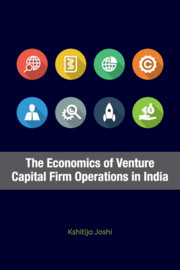Book contents
- Frontmatter
- Contents
- List of Tables
- List of Figures
- Acknowledgements
- 1 Introduction
- 2 Ecosystem and Strategic Decision Making
- 3 Context and Methods
- 4 Fund Raising: Systematic and Non-systematic Influences
- 5 High-Tech Clusters in India
- 6 Investment Strategies
- 7 Involvement and Value-Add in Investee Ventures
- 8 Venture Capital Exits: What Drives Success?
- 9 Conclusion
- References
- Index
4 - Fund Raising: Systematic and Non-systematic Influences
Published online by Cambridge University Press: 30 April 2020
- Frontmatter
- Contents
- List of Tables
- List of Figures
- Acknowledgements
- 1 Introduction
- 2 Ecosystem and Strategic Decision Making
- 3 Context and Methods
- 4 Fund Raising: Systematic and Non-systematic Influences
- 5 High-Tech Clusters in India
- 6 Investment Strategies
- 7 Involvement and Value-Add in Investee Ventures
- 8 Venture Capital Exits: What Drives Success?
- 9 Conclusion
- References
- Index
Summary
Introduction
The aim of this chapter is to analyse the supply (Ss) side of the VC ecosystem in India. On the supply side, the limited partners (LPs) and the general partners (GPs) constitute the key players governing the flow of VC funds. Among these, the LPs are the fund providers that determine the aggregate quantum of VC funds allocated to India. The GPs are the fund managers who raise these funds and invest them in fledgling investee companies (Gompers and Lerner 2004). In general, the flow of aggregate VC funds is impacted by the macro fundamentals of the economy and the conducive policy environment (Cumming and Macintosh 2006; Bonini and Alkan 2009; Cherif and Gazdar 2011). On the other hand, the fund-raising potential of the individual VC fund managers is the function of their historical reputation and performance (Gompers and Lerner 1999). The former set of factors are referred to as systematic influences since they tend to affect all the VC fund managers in a uniform manner. The latter set of factors are the nonsystematic influences since these vary based on the reputation and performance of each fund manager.
In this chapter, we first examine the systematic influences on aggregate fund-raising. We then probe the role played by the non-systematic influences in determining the fund-raising potential of the VC fund managers.
Supply of Vc Funds
The aim of this section is to lay out a plan for in-depth analyses pertaining to the supply side of the VC ecosystem.
Conceptual Framework on the Factors Influencing the Supply of VC Funds
A broad structure for analysing the supply of VC funds has been given in Figure 4.1. The key hypotheses based on the same have been outlined here.
Proposed Hypotheses
Hypothesis 1: Higher growth of real gross domestic product (GDP) positively influences aggregate fund-raising (in general, more funds are directed to growing economies).
Hypothesis 2: Higher interest rates on risk-free assets negatively influence aggregate VC fund-raising (since the opportunity cost of allocated funds to VC as a conduit of investing funds increases).
Hypothesis 3: Robustness of the stock markets positively influences aggregate fund-raising (since initial public offering [IPO] is known to be the most profitable channel of exiting VC investments).
- Type
- Chapter
- Information
- Publisher: Cambridge University PressPrint publication year: 2020



